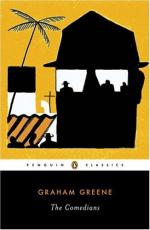
|
| Name: _________________________ | Period: ___________________ |
This test consists of 5 multiple choice questions, 5 short answer questions, and 10 short essay questions.
Multiple Choice Questions
1. What is the name of the Tonton Macoute who begins speaking to Brown?
(a) Captain Henderson.
(b) Tin Tin.
(c) Captain Concasseur.
(d) Petit Pierre.
2. According to the note Doctor Magiot received, where is young Philipot?
(a) Safely arrived in Florida.
(b) In the mountains, moving north.
(c) Nearly to the sea.
(d) In hiding in Port au Prince.
3. When Brown returns to his hotel in Santo Domingo, what does he find on his pillow?
(a) A letter from Doctor Magiot.
(b) Money from Mr. Smith
(c) A letter from Joseph.
(d) A note from Martha.
4. What do Brown and Doctor Magiot do with Philipot's body during the night?
(a) Dump it unceremoniously in a ditch.
(b) Lay it behind some bushes near an abandoned cottage.
(c) Bury it at the edge of the neighbor's property.
(d) Prepare it for burial according to local Voodoo custom.
5. Why does Jones hurry Brown and Smith out of his cell?
(a) The doctor is coming.
(b) The guard is coming.
(c) He is tired of their company.
(d) He needs the bathroom.
Short Answer Questions
1. As explained in Part 1, Chapter 2, how does Petit Pierre, a journalist, treat every day?
2. Where do Brown and Martha rendezvous most often?
3. When the Smiths first arrive at the Hotel Trianon, what does Mr. Smith think of the body crouched in the pool?
4. Why do Brown and Jones meet under embarrassing circumstances?
5. A Tonton Macoute strikes up a conversation with Brown. Who is this man?
Short Essay Questions
1. On the way to the hotel immediately after his arrival in Haiti, Brown and Martha are stopped at a roadblock and searched. What is the purpose of telling this scene?
2. In Part 1, Chapter 5, the small funeral entourage that drives to Petionville to bury Doctor Philipot is in a great hurry. Why is this? How does this tie in with the doctor's death?
3. Jones is the mysterious guest whom Captain Concasseur is protecting at Mere Catherine's and the man who was occupied with Tin Tin. What is the effect of this surprise? How does it help to reveal Jones's character further?
4. Throughout Chapter 1 of Part 1, the captain advises people to stay in touch with their respective consulates. Why is this, and how does it set the tone of the book?
5. Brown is aware of the ridiculous nature of three men with common names: Jones, Smith, and Brown. What does this tell the reader about Brown's view of the story?
6. From a literary aspect, what is the effect of portraying Jones as an actor who has not learned his lines well? Why does the author use this characterization throughout the book?
7. When Brown and Mr. Smith visit the Secretary of State, hoping to free Jones, how is Brown successful? Why is Mr. Smith's bluntness ineffective?
8. In Part 1, Chapter 3, why does Brown tell the story of his lost virginity? How does his youthful past tie into his present relationship?
9. When Angel has the mumps, Brown visits him at Martha's insistence, and this is the only time the two people interact for any length of time. What is the effect of this meeting? How is Angel portrayed?
10. Throughout Part 1, Chapter 4, the reader sees an interplay of men in power. How does this affect the story? In this situation, does power have meaning?
|
This section contains 1,481 words (approx. 5 pages at 300 words per page) |

|




